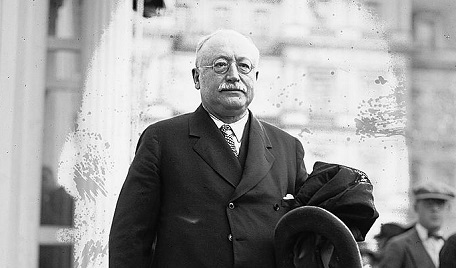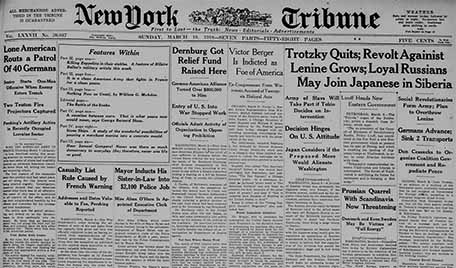[ad_1]
An obscure incident involving the 14th Modification’s Disqualification Clause is getting some new consideration within the lead-up to Supreme Courtroom arguments about former President Donald Trump.
 On February 8, 2024, the Courtroom will think about Trump v. Anderson, a case that arrived on an expedited foundation. The query earlier than the justices is “whether or not the Colorado Supreme Courtroom erred in ordering former President Donald Trump excluded from the 2024 presidential main poll.”
On February 8, 2024, the Courtroom will think about Trump v. Anderson, a case that arrived on an expedited foundation. The query earlier than the justices is “whether or not the Colorado Supreme Courtroom erred in ordering former President Donald Trump excluded from the 2024 presidential main poll.”
The Colorado Supreme Courtroom’s resolution discovered that Trump was not eligible to be positioned on the state’s presidential election poll for the reason that Structure’s 14th Modification bars individuals who take a constitutional oath after which are a part of an rebel from holding federal workplace. The choice was stayed pending motion on the U.S. Supreme Courtroom.
Podcast: Ought to President Trump Be Allowed on the 2024 Poll?
Among the many many precedents and authorized questions posed within the briefs for Trump v. Anderson are fleeting references to 1 public debate after the Reconstruction period on the Disqualification Clause: the Home’s refusal in 1919 and 1920 to seat Victor L. Berger, an elected consultant discovered responsible beneath the Espionage Act. A near-unanimous Home voted that Berger couldn’t serve since he had violated the 14th Modification’s Disqualification Clause.
And whereas the Trump and Berger conditions are totally different, the intensive Home debates over Berger and his constitutional rights increase some perception about how lawmakers seen the 14th Modification’s Part 3 greater than a century in the past.
The Berger Case
Victor L. Berger was the primary Socialist get together member elected to the Home of Representatives. Born in Austria, Berger got here to the US on the age of 18 and settled in Milwaukee, the place he printed a number of Socialist Occasion newspapers and was a celebration chief. Berger gained election to the Home of Representatives in 1910 and was not re-elected in 1912. Through the World Struggle I interval, Berger publicly opposed the conflict in his newspaper, The Milwaukee Chief.
Berger and a number of other different Socialist Occasion leaders have been indicted in federal court docket in March 1918 beneath the Espionage Act. Berger was cited for six newspaper articles that “inspired disloyalty and interfered with recruiting for the navy.” His newspaper additionally misplaced its submit workplace privileges.
City Corridor Video: From Spies to Leakers: The Historical past of the Espionage Act
Undaunted, Berger ran for the Senate unsuccessfully in April 1918, however he gained a three-person race for the Home’s closely German-American Fifth District seat in November 1918, whereas he was beneath federal indictment.
In January 1919, Decide Kenesaw Mountain Landis discovered Berger and his fellow defendants responsible of obstructing the nation’s conflict efforts, and so they have been sentenced to between 4 and 20 years in federal jail. Berger instantly appealed to the Seventh Circuit court docket and made bail. In Could 1919, Berger appeared on the Home of Representatives to take his oath of workplace. As an alternative, Home Elections chair, Consultant Frederick Dallinger of Massachusetts objected, and the Home handed a decision suspending Berger till a particular committee was in a position to serve.
The particular committee selected Could 26, 1919, to think about if Berger violated Part 3 of the 14th Modification, which barred those that had “having beforehand taken an oath, as a member of Congress” from serving if that they had “engaged in rebel or rise up in opposition to the identical or given help or consolation to the enemies thereof.”
The Arguments on the 14th Modification and the First Modification
 On June 11, 1919, committee hearings started, with Milwaukee legal professional Henry Cochems representing Berger, and Dallinger chairing the nine-person Home committee. Cochems shortly introduced up the difficulty of the 14th Modification as the only real query in entrance of the particular committee. Dallinger responded that Berger’s alleged violations of the Espionage Act of 1917 have been additionally an element for the Home to think about.
On June 11, 1919, committee hearings started, with Milwaukee legal professional Henry Cochems representing Berger, and Dallinger chairing the nine-person Home committee. Cochems shortly introduced up the difficulty of the 14th Modification as the only real query in entrance of the particular committee. Dallinger responded that Berger’s alleged violations of the Espionage Act of 1917 have been additionally an element for the Home to think about.
Cochems then argued that the Amnesty Act of 1898, which eliminated the incapacity from workplace of about 750 remaining Accomplice troopers, truly repealed all of Part 3 of the 14th Modification, because it solely utilized to actions associated to the Civil Struggle. Dallinger was skeptical. “Do I perceive you that you just contend that [act] repealed the complete Part 3 of the 14th Modification?” Dallinger requested. Cochems replied that there was “little question. The opposite argument made by Berger’s legal professional was that the Home couldn’t deny a seat to a consultant if he arrived with an official state election certificates. As soon as taking the oath, the brand new Home member may solely be expelled by a two-thirds majority vote.
Cochems’ two arguments weren’t profitable. The committee’s majority report in October 1919 said that “each of those contentions are unsound and should not supported both by precept or by precedent. … The rivalry that Part 3 of the Fourteenth Modification to the Structure is not relevant, is just not worthy of great consideration.”
The Home Committee additionally discarded First Modification arguments based mostly on a number of latest Supreme Courtroom selections, together with Sugarman v. United States and Schenck v. United States.
“It was argued at nice size, each by Mr. Berger and his counsel, that his conviction at Chicago and any try to deprive him of his seat in Congress can be a violation of the liberty of speech and the press assured by the First Modification to the Structure of the US,” the bulk report famous. The committee quoted Justice Oliver Wendell Holmes Jr.’s opinion in Schenk: “When a nation is at conflict, many issues that is likely to be mentioned in time of peace are such a hindrance to its effort that their utterance won’t be endured as long as males battle and that no court docket may regard them as protected by any constitutional proper.”
The committee beneficial that “if the Home is glad that Consultant-elect Berger did give help or consolation to the enemies of the US, he’s ineligible to a seat on this Home, and it’s not solely the fitting however the constitutional responsibility of the Home to exclude him.” On November 10, 1919, the Home eliminated Berger in a 311-1 vote.
Berger Returns to the Home
The Home determined {that a} particular election was wanted in Wisconsin to select Berger’s alternative. In December 1919, Berger simply gained the particular election in opposition to a candidate supported by the Democratic and Republican events. Once more, Berger went to the Home on January 6, 1920 to take his oath, and Dellinger refused his request to be seated. On January 10, 1920, the Home voted 330-6 to disclaim Berger’s credentials “by purpose of the truth that he had violated a legislation of the US, and, having beforehand taken an oath as a Member of Congress to help the Structure of the US, had given help and luxury to the enemies of the US, and for different good and enough causes.”
Nevertheless, Berger’s congressional profession was not over. His federal Espionage Act conviction went to the Supreme Courtroom, and on January 31, 1921, a divided Courtroom threw out Berger’s conviction on grounds that Decide Landis mustn’t have been allowed to listen to the case. Berger and his co-defendants had requested for one more choose after Landis made repeated public derogatory feedback about German Individuals, and the movement had been denied.
Berger gained one other election to the Home in November 1922, and he took his seat with no opposition on December 3, 1921. Berger gained two different phrases within the Home through the Twenties earlier than he left politics to focus on his newspaper.
Scott Bomboy is the editor in chief of the Nationwide Structure Heart.
For Extra Info
Library of Congress: Victor Berger: Matters in Chronicling America
Home of Representatives: Consultant Victor Berger of Wisconsin, the First Socialist Member of Congress
Cannon’s Precedents: Chapter 157 – The Oath As Associated To {Qualifications}
Edward J. Muzik, “Victor L. Berger: Congress and the Pink Scare,” The Wisconsin Journal of Historical past, Vol. 47, No. 4 (Summer time, 1964), pp. 309-318. Out there on-line at http://www.jstor.org/secure/4633977.
[ad_2]
Source link




